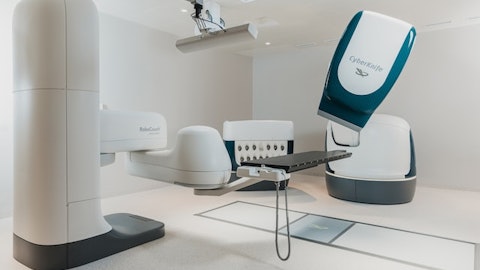Bill Sutherland: And these are — and you’re contracting with both sides of these of these companies, right? Both the commercial and the Medicare and I guess Medicare Advantage?
Greg Crawford : Yes. It would be for all their commercial lines Medicare Advantage lines, and also the Medicaid state Medicaid advantage lines.
Bill Sutherland: Are you seeing any deals where they want you to be part of like a sub capitation, I’m taking Medicare Advantage, some of those developments in that side.
Greg Crawford : Yes, we are in that there are some things right now in that are currently in the very, very, very early stages in that are more of — it seems like a 25 in that type thing. There are a few of the payers in that are starting to negotiate and figure out what options are in that as it comes to ‘25 and that, and how they’re going to do contracting. I think, typically they’re about a year, out in that on the contracting piece, and then they’ll take and go out and sell this to the Medicare beneficiaries when the open enrollment comes in late calendar Q4 of ‘24 for the ‘25 service year.
Bill Sutherland: So you guys are doing the — going through the exercise of figuring out what the risk levels you’re willing to — you have a very predictable business, so this shouldn’t be too hard for you, right?
Greg Crawford: Yes. I mean, we have it actually and that had capitated contracts or anything like that. But we do have a very clear handle on that, on what it costs us to operate so with census and that we can get a pretty good idea in that, of what that would look like.
Operator: Our next question comes from Julian Hung of Stifel.
Julian Hung: Hi, this is Julian subbing in for Justin today. My first question is on recent labor challenges and strikes within the healthcare industry. Have you seen any impact on Quipt in any way? And on the flip side, does it increase demand for home healthcare?
Greg Crawford: Yes, so as far as the labor strikes or anything that hasn’t affected Quipt directly, maybe in some markets it’s affected us indirectly and now with a slow in some referrals and that in our west coast operations and that it would’ve happened in that during calendar Q3, I’m sorry, but nothing odd that was like a direct impact from an employment standpoint or anything. We’ve been pretty steady in that with our recruitment efforts and our retention efforts in that throughout ‘23. Excuse my voice, I’m about ready to lose it here with a hold that I’m carrying. So if you can’t give me through.
Julian Hung: Yes. And I had another question about the Medicare with deductibles in premiums going up starting next month at 6%, which is a bit higher than usual. Does that potentially impact how much revenue you can make?
Greg Crawford: Well, it could potentially in that impact our bad debt expense, but not necessarily how much revenue I guess, and that because we’re still going to have the top line revenue that needs going to be there for the patient. But we wouldn’t anticipate anything that would move the needle or anything with that increase. Most of those Medicare patients, and that would’ve some type of secondary anyway or otherwise, they’ll likely set up payment plans like they have historically.
Julian Hung: And just one last question on the potential merger talks between Humana and Cigna, even though it did fall through how would it have impacted insurance rates? And you mentioned you were working with Cigna. Was there any impact on that?
Greg Crawford: No impact in that from us obtaining our national insurance contract or anything. And that, I mean, at least immediate in the ground or anything, we weren’t getting any feedback on that. So, as far as predicting where rates would’ve gone and that’s a really tough one to do. Most of these large payers in that if you’re providing value add service, they are open to rate negotiations and that in order to help keep these patients in the home for home-based care to keep them out of hospitals and facilities.
Operator: Our next question comes from Richard Close of Canaccord Genuity.
Richard Close: Just a follow on to Bill’s question on the sales force. Are there any targets associated with fiscal ‘24 where you’d want to be exiting ’24 with a certain number of sales numbers? Just curious there.
Greg Crawford: I mean, we had areas that we wanted to continuum areas that we wanted to add the sales force to. I feel that we’ve achieved this if not exceeded this year. But we haven’t had a set number or anything yet in that for ‘24 to say that we want to cover. We do still have a lot of ground in that to cover in that with continuum areas. As it relates to operations west of the Mississippi, most of the hiring that we’ve seen has been in the Southeast and the Midwest.
Richard Close: And when you guys add because you added a chunk, I guess since you last reported, I’m just curious, how long does it take to for a sales person to ramp up and really become effective?
Greg Crawford: Yes, typically in that about two quarters six months or so, we can usually get a pretty good idea on that after 90 days in that whether or not they’re going to be able to make their targets and things. But typically before they’re really contributing, you’re looking at six to six to nine months, typically about six months.
Richard Close: And then with respect to PAPs supply, can you talk a little bit about the supply chain dynamics? Maybe what you’re seeing on the pricing front?
Hardik Mehta: This is Harding, sorry. Not sure I follow the question. Can you rephrase that please?
Richard Close: I’m just curious, obviously, supply of CPAP has improved over the course of fiscal ‘23. I’m just curious whether there’s anything to be aware of in terms of the current levels or access to units CPAP units for you guys. Whether any there’s been any pricing changes in the market at all for you?



